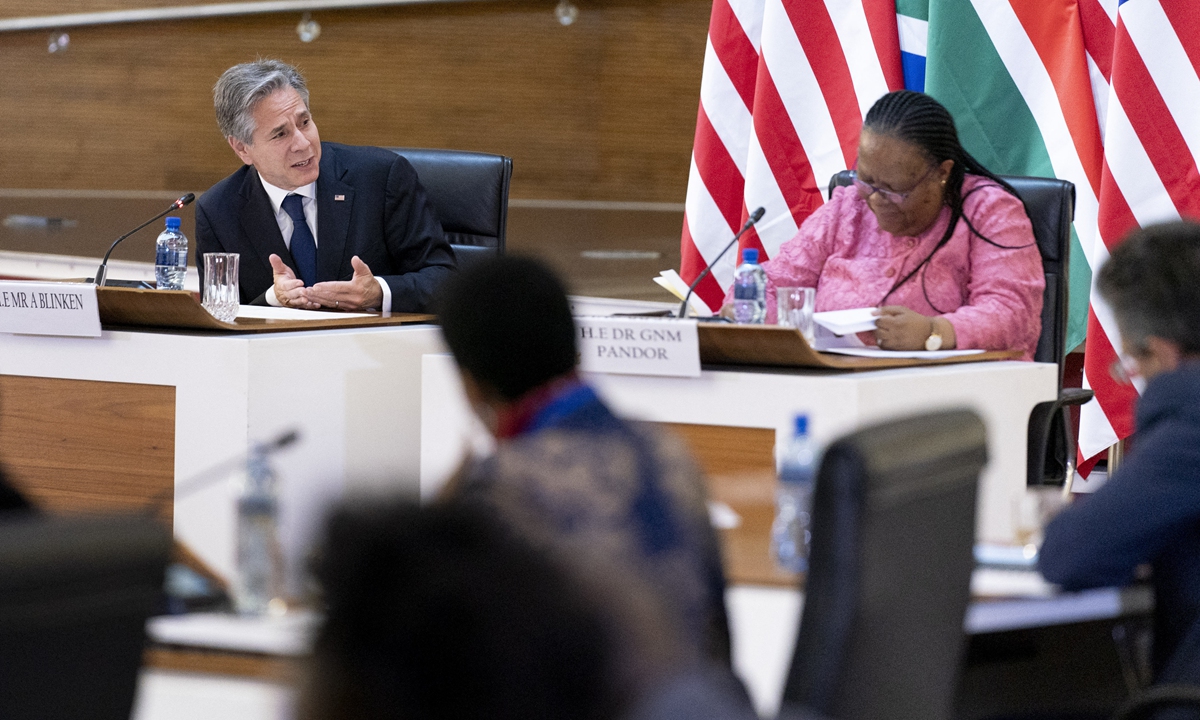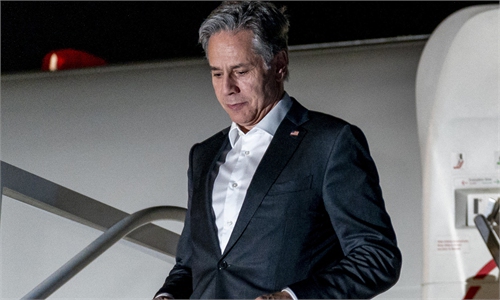
South Africa's Foreign Minister Naledi Pandor (R) and US Secretary of State Antony Blinken (L) attend a strategic dialogue opening session meeting at the South African Department of International Relations and Cooperation in Pretoria, South Africa, on August 8, 2022. Photo: AFP
On Sunday US Secretary of State Antony Blinken began his three-nation tour of Africa. The US media reported the trip as being aimed at a new cold war, in what Western analysts say is an attempt to counter Chinese and Russian influence in the region.
Blinken's choice of countries for his African tour - South Africa, the Democratic Republic of Congo (DRC) and Rwanda - is a strategic choice. South Africa is a member of BRICS and is an influential economy in the continent; the DRC is the richest mineral resource country in Africa and the biggest current supplier of coltan and cobalt to big US firms.
Nelson Mandela's political party, the African National Congress (ANC) which has been in power in South Africa since 1994, has a very strong position regarding geopolitical power relations worldwide. Its position is informed by its historic experiences as a liberation movement that was refused support against the Apartheid by the US and Western Europe in its early days but got overwhelming support from China, the USSR, Cuba and some others in Asia, Africa and Eastern Europe. The post-Apartheid South African government led by the ANC has gone on to denounce the unilateral war in Iraq and joined the BRICS grouping in its quest to contribute to a just, equitable and secure world.
At the UN General Assembly in April 2022, being one of 58 countries, South Africa abstained from a resolution to call for Russia to be suspended from the Human Rights Council. Others within the South African state and in the ANC have argued that other nations (the US and NATO) had not been suspended from the Human Rights Council following their violations of human rights in Iraq, Libya and Syria, among others. In other words, the UN has ceased to take resolutions objectively against all nations for violating the same rules.
Despite US support for NATO expansion toward Russian borders threatening its sovereign and security since the 1990s, Blinken in his BBC interview in May 2022 indicated that China tries to undermine or challenge the rules-based order. The objectives of the visit by Blinken to South Africa where he will announce the US government's new Africa Strategy are very predictable. The US wants to persuade the African continent that China and Russia are Africa's biggest enemies. On the contrary, however, there is overwhelming evidence from history to date that suggests that the Western world has worked against the economic and political interest of the African states.
In regard to fermenting a wedge between South Africa and China or Russia, the US has little chance of success. China is South Africa's biggest trading partner ahead of Germany and then the US. The US influence is slowly but surely diminishing. South Africa is looking to Russia for food and oil supplies in the midst of current global economic turmoil besides its long historic relations with that nation.
Evidence on the ground as well as data suggests that China and Russia are increasing their economic and therefore political influence on the African continent. China is currently funding major infrastructure programs like roads, railroads, dams and airports and ports in most African states which the West through many years of colonialism and post-colonial relations has ignored. In 2021, China-Africa trade rose by over 35 percent to $254 billion from the year before.
After many years of an "off-hands" approach toward Africa since the colonial liberation days, in July 2022 Russian Foreign Minister Sergey Lavrov visited Africa and urged that the continent should have a Russian strategy to avoid becoming a pawn in global power games. This is an honest foreign policy advice and outlook that an international power has articulated toward Africa. By 2020 Russia's trade with Africa amounted to over $14 billion and supplied over 40 percent of arms to African states.
On the contrary, the US foreign policy is unfortunately not stable and largely dependent on the president of the day. Despite its rhetoric on economic, human and political rights, the US has not on the floor of its own Senate or UN General Assembly denounced the injustices perpetrated against the African continent historically and to date. France, for instance, has continued imperial economic hegemony in Francophone Africa in the face of the indifference of the US and Western nations.
History is very important to the African people and to the African states. Undoing some of the West's misdeeds in Africa or a mere acknowledgement of past and current injustices perpetrated by their states and their corporations would go a long way; but alas, it seems that the West will forge ahead blindly to satisfy its presidential donors and sponsors. Therefore, successive US governments are likely not going to change their foreign policy against Africa or any other nation until the US political system frees itself from the shackles of its corporate world.
The author is Executive Dean of the Faculty of Management Sciences at the Durban University of Technology and a former director of the South African BRICS Think Tank. opinion@globaltimes.com.cn

